5 marketing contract templates for agencies & freelancers
Ready to sign that new client? Here are five of the best marketing contract templates you can use when onboarding your new marketing client.

Making sure I felt safe and reassured was at the top of my list when I first started doing freelance marketing full-time.
I didn’t just want to feel safe knowing I had predictable work and a “stable” income, but also in the sense that what I was doing was legally sound. I remember when I signed my first client, I immediately looked up different marketing contact templates to make sure I was covered legally.
It was really confusing. And making sure I had all the right elements in my contracts was something I started to lose sleep over. But, over time, I started to figure it out.
And that’s why I’m excited to write this article because it’s something I wish I had when I first started freelancing over 18 months ago.
In this article, I’ll go over why marketing contracts are so important, the essential elements they should include, and five different templates you can use.
However, before we dive in, I want to mention that I am not a professional when it comes to legal advice. Please do your due diligence and double-check with a legal advisor in your area before you officially send and sign any contract. Okay, with that out of the way, let’s get started.
Why marketing contracts are important
Having a detailed services agreement signed by all parties before starting work is strongly advised for agencies and freelancers. Agency and freelance contract templates capture specifics like project scope, deliverables, timelines, fees, confidentiality, approval protocols, and more to set clear expectations upfront.
Well-structured contracts prevent a whole host of issues down the line that can seriously hamper campaign success and even spark legal disputes. Clearly outlining mutual accountability and responsibilities in writing fosters transparency from day one.
Also, presenting a professional services agreement during the sales process can really reflect highly on an agency’s operational credibility with prospects. It signals that you take the partnership seriously and take steps to secure the data, resources, and effort collaborating requires.
Potential clients recognize the seriousness and strategic nature of the engagement when a well-thought-out contract is provided upfront before accepting payments. It demonstrates preparedness and helps qualify leads who express reluctance to sign paperwork.
Overall, the adage “good fences make good neighbors” rings very true in marketing. Taking the time to formalize the working arrangement through a detailed contract sets the stage for a smooth, successful relationship fueled by mutual understanding.
Essential elements to writing a marketing contract
While legal language in contracts can become complex quite fast, most marketing services agreements include versions of the following 6 fundamental sections:
Scope of work
The scope of work is essentially a detailed description of the services you’re going to provide. Be as detailed as possible in capturing the number of blog posts, social campaigns, website pages, funnel build-outs, ad campaigns, and other key components highlighted in the original proposal and discovery process. Productizing your services also prevents scope creep down the line.
Payment terms
This section details all fee structures whether one-time payments, recurring retainer schedules, reimbursement policies for ad spend or expenses, late fee calculations, and accepted payment methods. Covering financial expectations thoroughly prevents billing confusion.
Duration and termination
The duration segment defines the negotiated length of contract validity and conditions allowing for early termination by either party (typically 30 days written notice is common). Establishing these terms prevents assumptions around renewal or dissolution.
Confidentiality clauses
This part includes NDAs (non-disclosure agreements) and privacy protocols around protecting any sensitive information provided throughout the engagement — whether campaign data, intellectual property, analytics, or other proprietary business intelligence. Security is crucial for both you and most (if not all) of your clients.
Deliverables and deadlines
This section highlights each key outcomes and deliverables you are responsible for producing along with associated completion timeliness and deadlines for easy tracking. You’ll also want to outline expected review and approval cycles for client sign-off at key checkpoints.
Dispute resolution
The last part is to outline steps like mediation or arbitration to resolve substantial disagreements before involving formal legal recourse. Well-defined procedures aim to prevent brand damaging disputes.
Note that these are general essentials to a marketing contract. Depending on the type of services you provide, the types of industries and clients you work with, and your local laws, you’ll want to double-check with a professional legal advisor before sending out any contracts.
While this article aims to help you understand what to include in a marketing contract, and go over examples of them (in the next section), none of this is actual legal advice.
5 examples of marketing contract templates
Here are five marketing contract template examples:
- Basic marketing services agreement
- PPC ads contract
- Social media services contract
- Influencer marketing agreement
- SEO services contract
Alright, let’s take a look at each one.
1. Basic marketing services agreement
When just starting out, a general basic marketing services agreement is a great contract template for covering all your bases without getting overwhelmed in complex legal lingo. It lays the groundwork for clearly capturing core areas like the work you’ll take on, how you’ll collaborate, payment expectations, and critical terms that keep everything smooth between you and your client.
While the template remains flexible enough to cover most standard services from digital ads to high-level consulting across industries, it also allows customizing specific clauses where needed without reinventing tons of legal wheels.
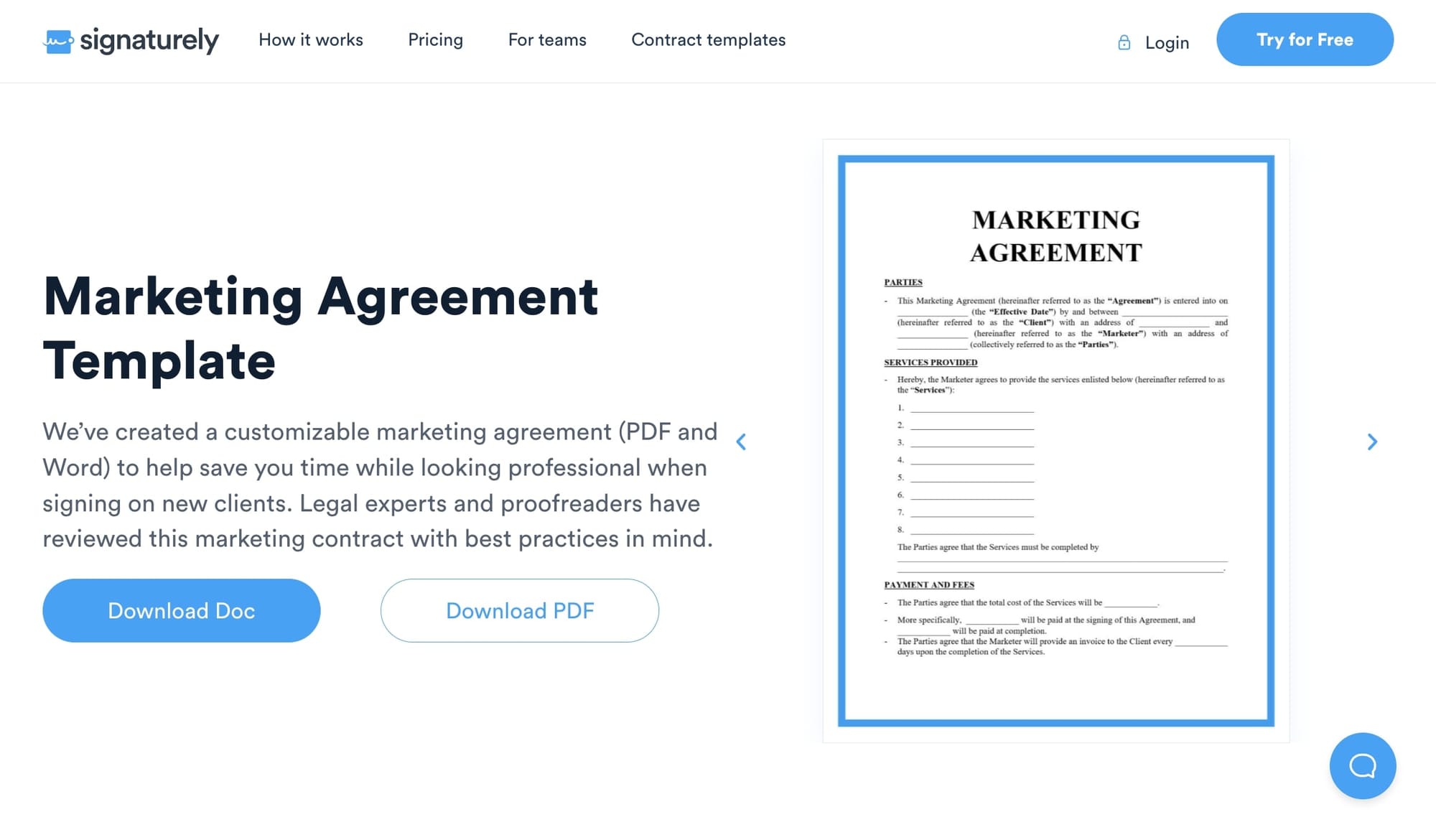
Signaturely has a great template you can check out for this type of work. It walks through scope, term length, termination protocol, intellectual property, and other essential sections in easy-to-understand language.
2. PPC ads contract template
If you offer pay-per-click services, having a strong PPC contract template is crucial for setting clear expectations with clients around campaign execution and ongoing optimization efforts.
The agreement would outline campaign specifics from structure, goals and budget to reporting cadence, success metrics, and management fees. Covering these details thoroughly prevents misunderstandings down the line around what you will deliver and how you will be evaluated.
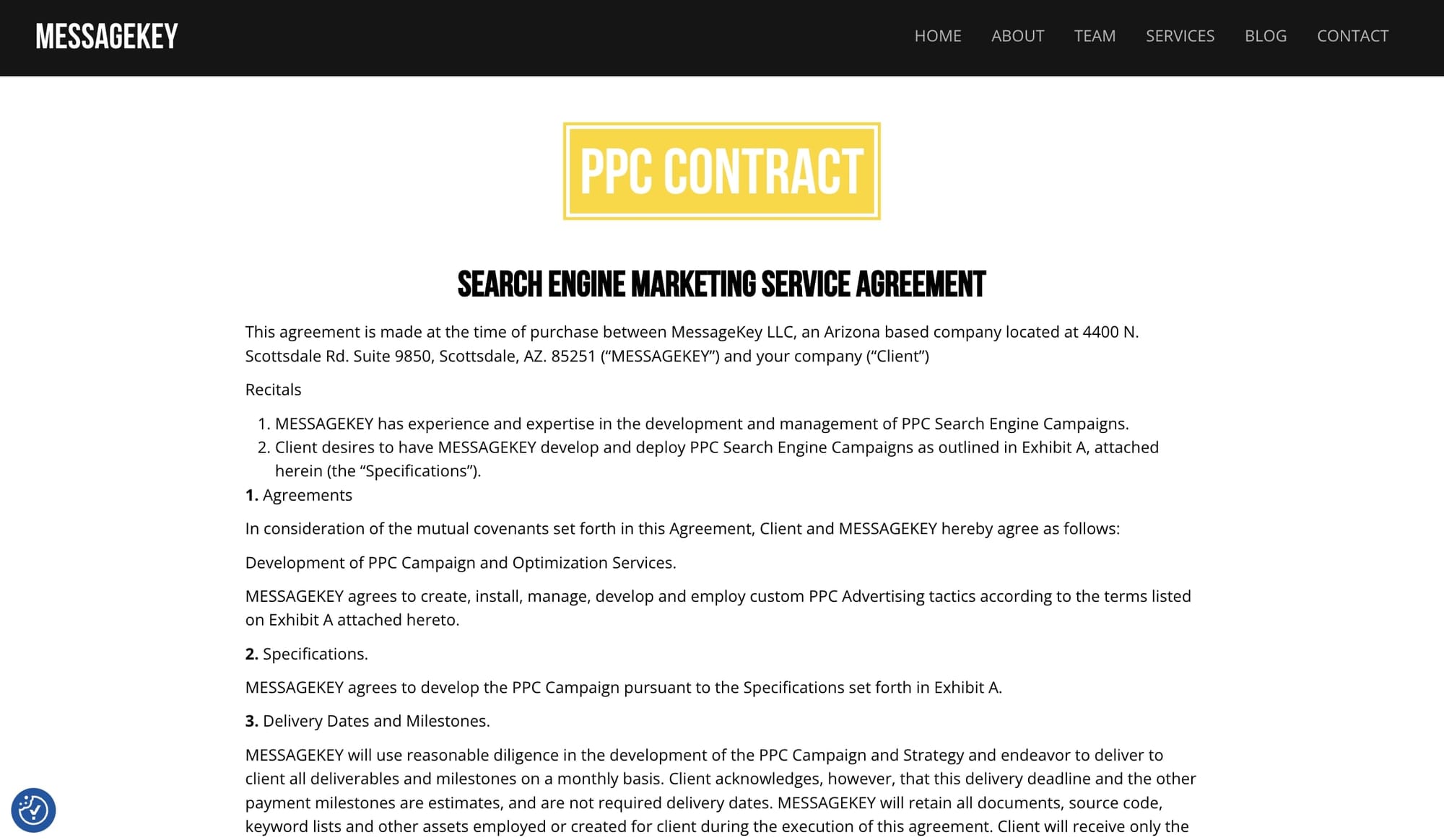
MessageKey has a solid PPC contract template you can check out. Their template allows you to capture all necessary aspects like campaign setup protocols, optimization processes, ad testing procedures, billing terms, and other specifics we’d agree to.
3. Social media services contract
Managing social media marketing requires alignment across many moving pieces — from content creation to community management and reporting. You definitely want to create clarity upfront through a solid social media services contract before kicking off any campaigns.
This agreement should map out the strategy and requirements on both sides, whether that’s posting schedules, content guidelines, target KPIs, reporting cadence, and management fees. Covering these details early prevents roadblocks down the line.
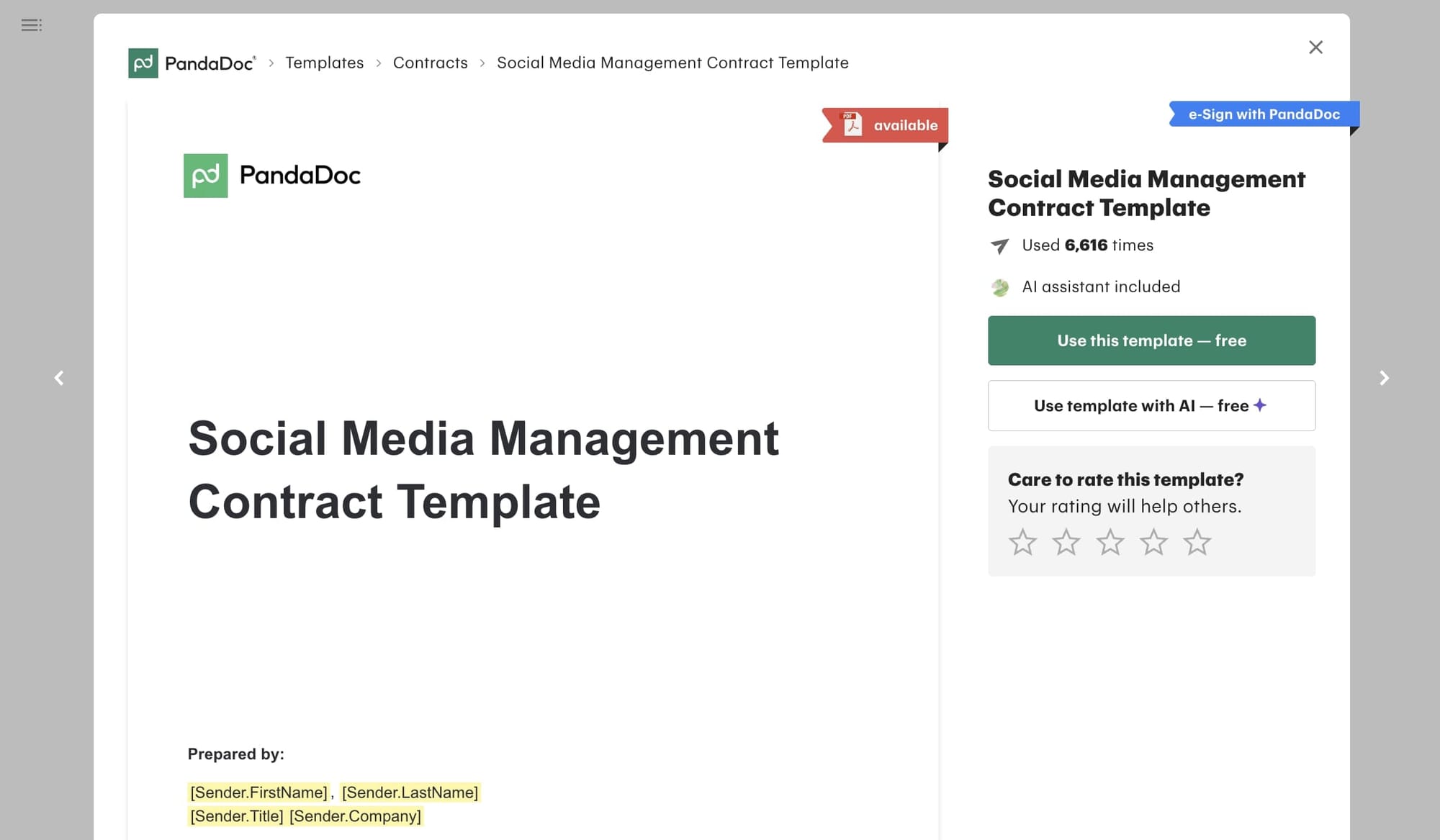
PandaDoc has a great social media services template that can be customized for your client’s niche and goals. Their template allows easily outlining the full scope of community management, engagement protocols, optimization processes, billing, and other must-haves you’d agree on.
The benefit PandaDoc offers is the flexibility to only include what’s directly relevant. This keeps the contract focused without unnecessary complexity that could distract. Having a clear, professional agreement in place demonstrates your capabilities while making sure both you and your client understand what success looks like.
4. Influencer marketing agreement: For partnerships with influencers.
Partnering with the right influencers can seriously take your brand’s reach and credibility to the next level. But failing to lock down the right agreement can leave either party at risk of confusion and misunderstandings.
That’s why putting together an influencer marketing agreement is so important before you pursue any partnership proposals. This contract would outline super clear expectations around content specifics, campaign goals, compensation terms, legal permissions, and other need-to-knows. Consider it your blueprint for streamlining an incredibly effective relationship on both sides.
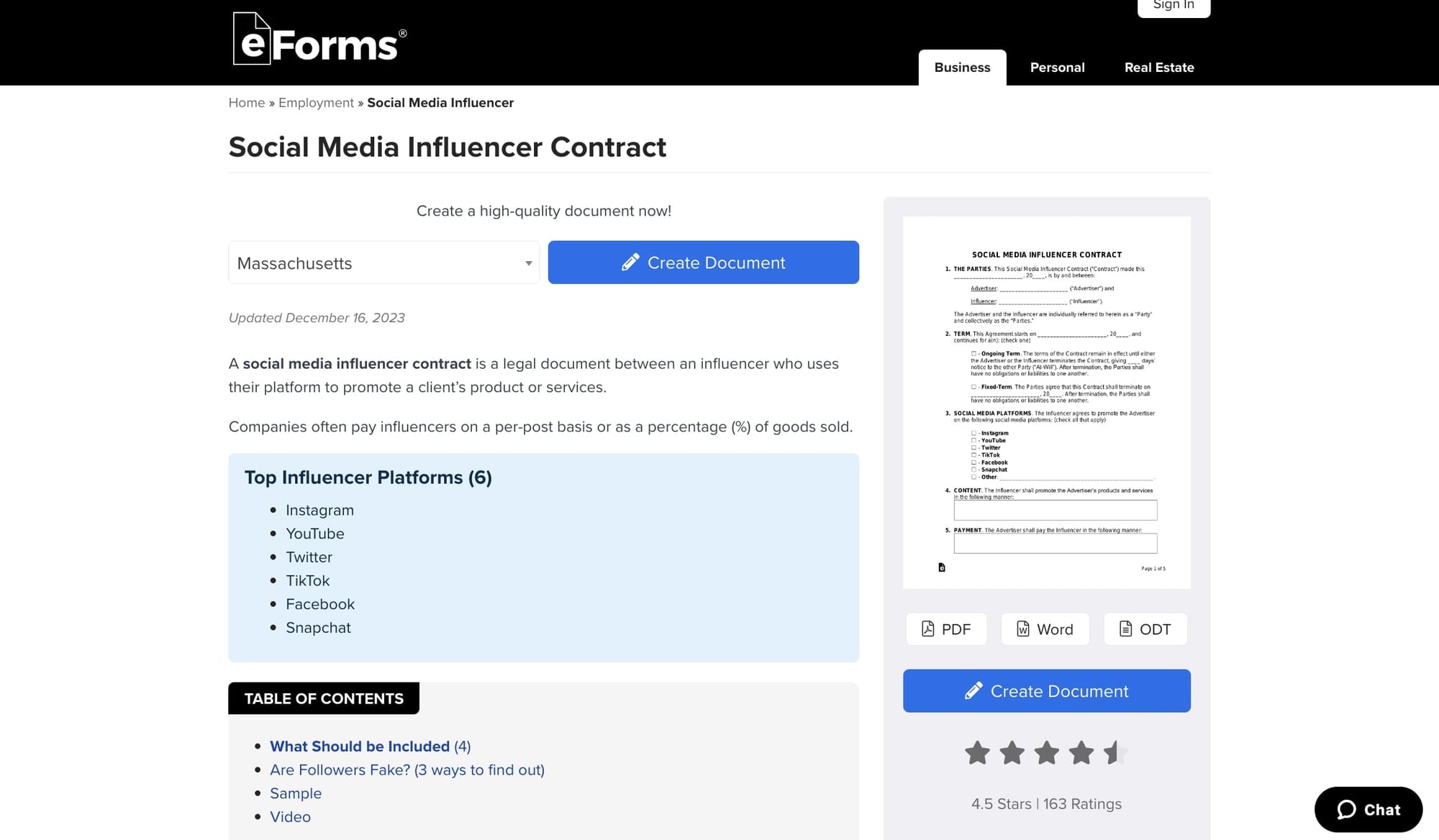
When drafting such formal agreements, I highly recommend checking out the template provided by eForms. They have agreements for different types of social media platforms like YouTube, TikTok, Instagram, X (formerly Twitter), Facebook, and Snapchat — making it easy to customize for whatever influencers and platform you’re working with.
5. SEO services contract
As an SEO expert, you know better than anyone how intricate search optimization can get across architecture tweaks, content expansions, technical migrations, link building, and constant monitoring. All that complexity means alignment with clients from the start is crucial for you.
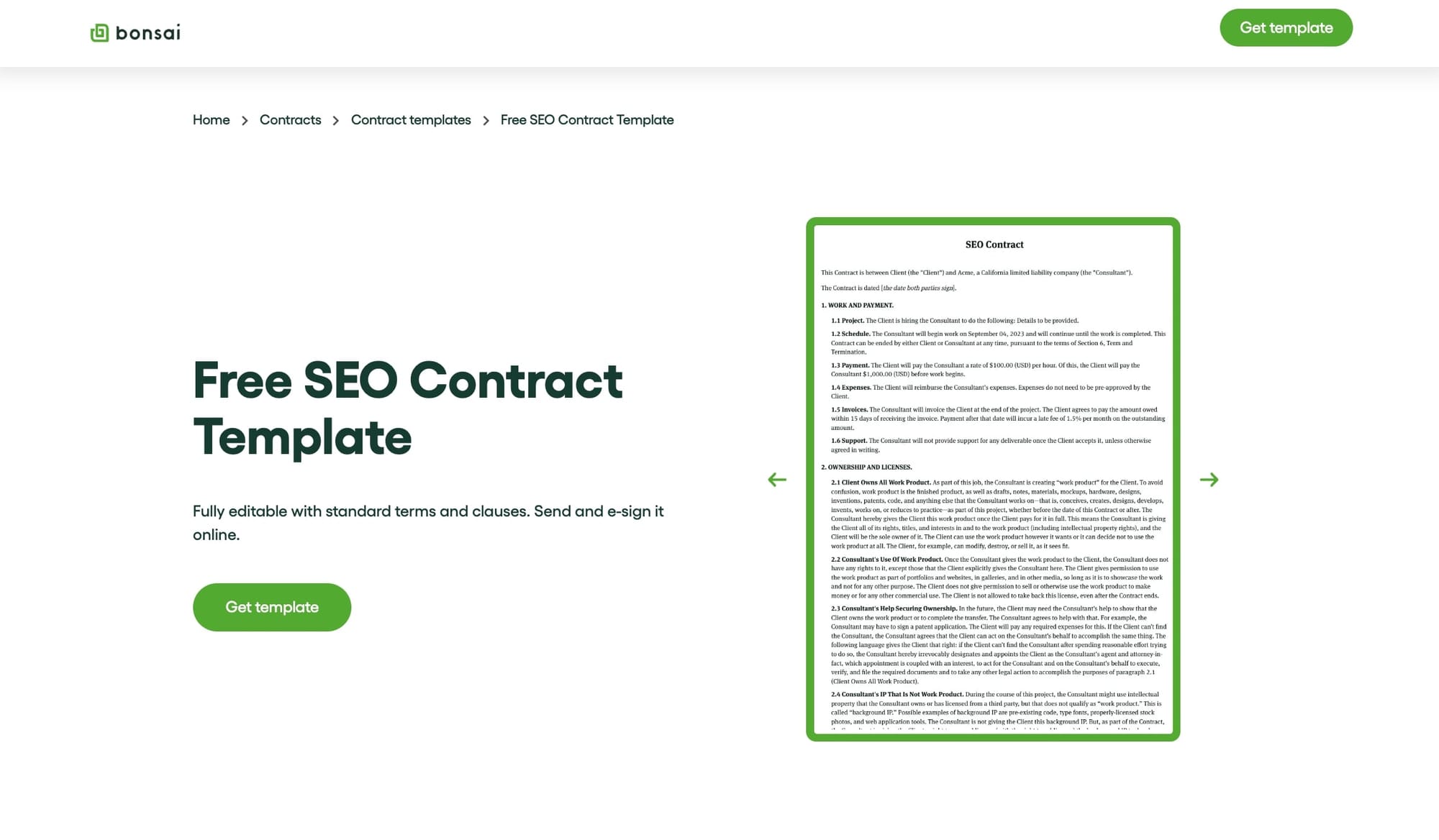
That's why leveraging an SEO services contract template like the one offered by Bonsai is so clutch before you kick off new site optimizations or website refresh projects. It’s actually the contract I first used when I started my freelancing business (before I moved over to Assembly).
Their template provides the precise language you need around scoping activities like site audits, keyword research, metadata updates, speed improvements, and customized reporting build-outs. It also allows you to define what success looks like for your clients, whether through rankings, traffic, conversions, or a number of leads generated.
Using Assembly for your marketing contracts
Between tracking multiple versions of agreements and securely sharing the latest deliverables, managing all the moving pieces around client contracts used to drain so much time and effort from actually doing the work.
This is where Assembly’s Contracts App comes into play.
Instead of manual paperwork and storing contracts on your computer, you can create, e-sign, and securely manage polished agreements entirely in Assembly now thanks to pre-built templates and automated workflows.
Things like automated version histories and expiration alerts make it smooth sailing. Integrations with client portals and billing in Assembly keeps things super consistent too.
The Files App has also streamlined collaboration by bringing together all assets, briefs, mockups, reports, and more in organized folders. Client-specific access settings, request forms, and audit logs make info security effortless while still allowing real-time collaboration between you, your team, and your clients.
Having project predictability at your fingertips through Assembly's purpose-driven tools can allow you to focus your energy on the work itself. Marketing clients definitely appreciate the structure powering transparency on both ends too!
If you’re ready to start streamlining your marketing agency or freelance business, be sure to play around with Assembly’s marketing demo portal!

